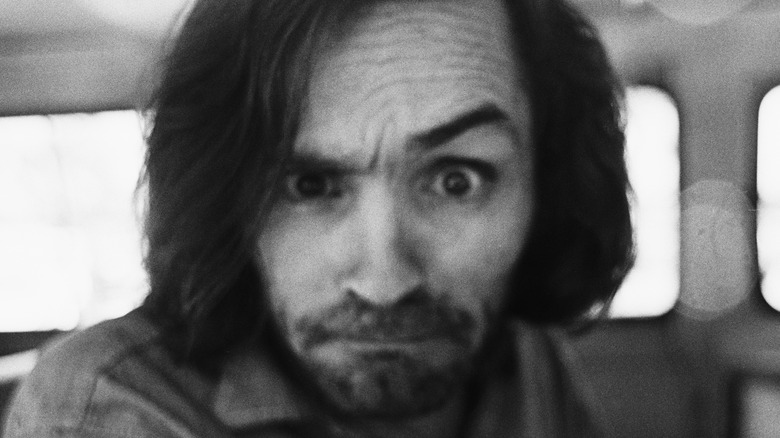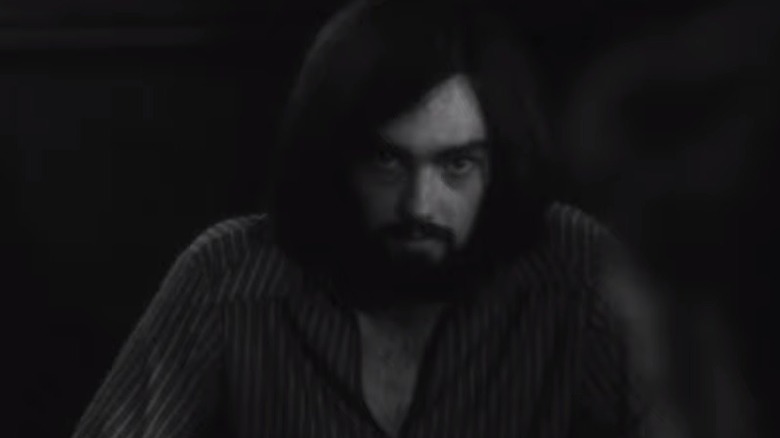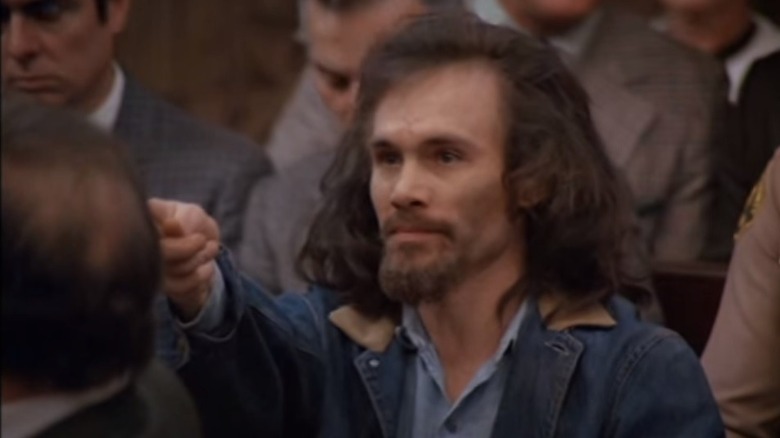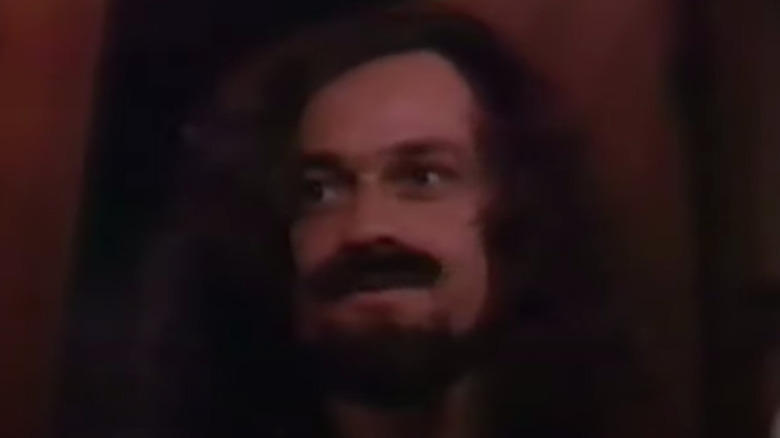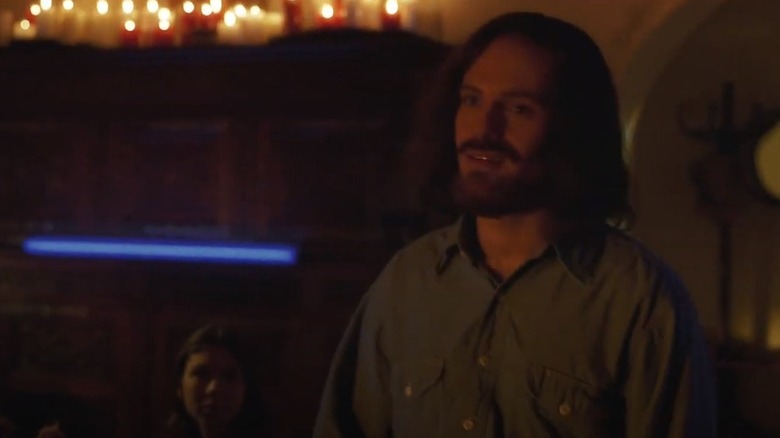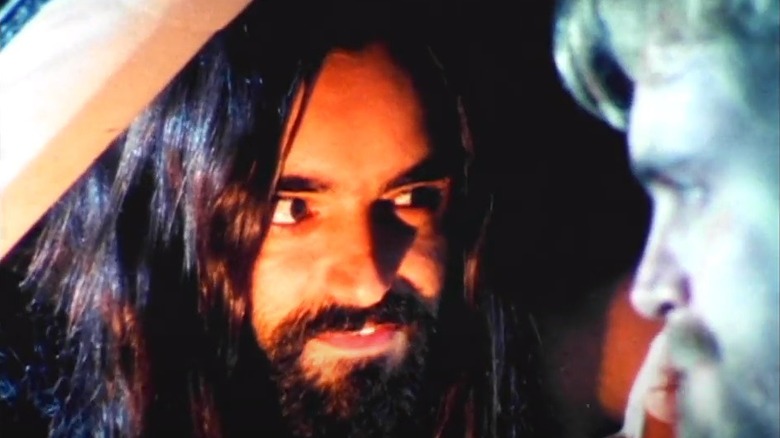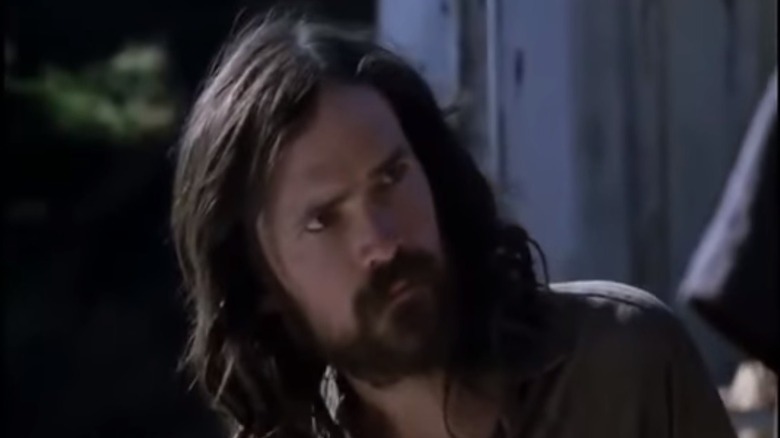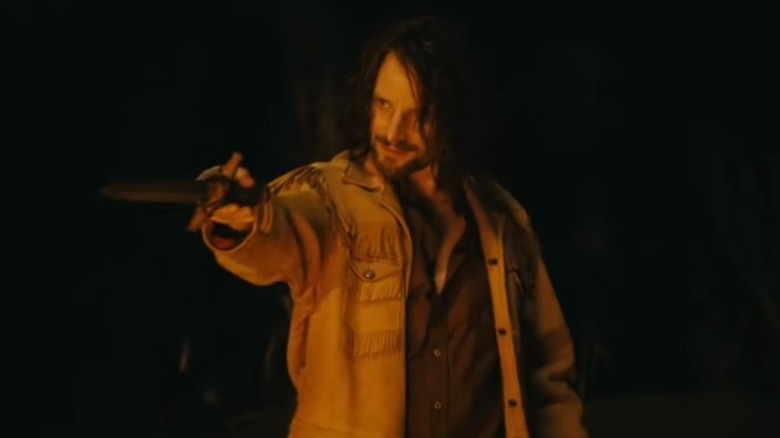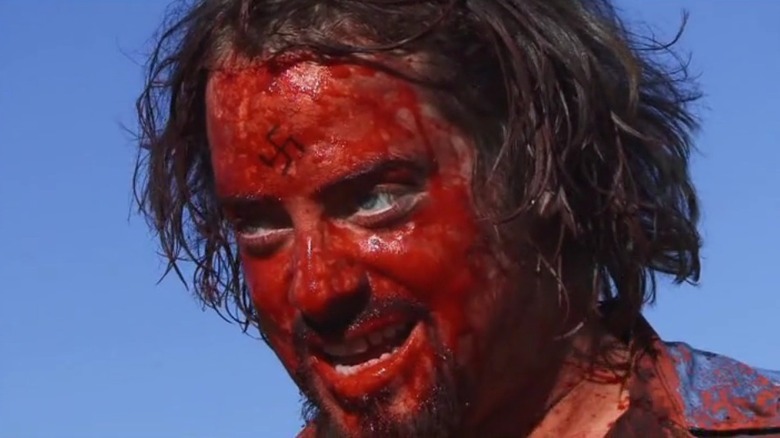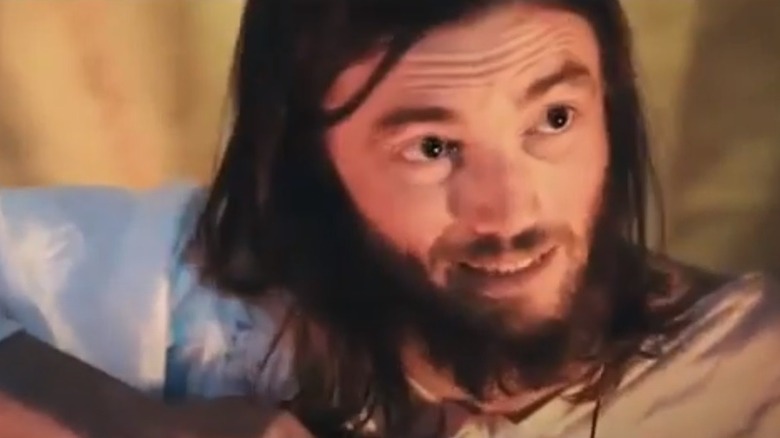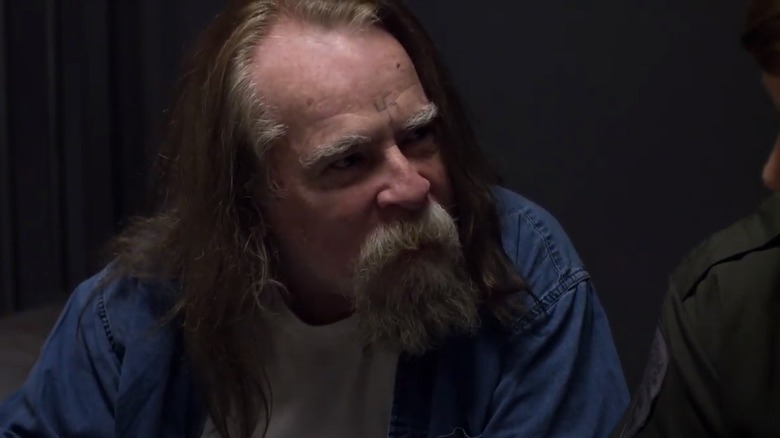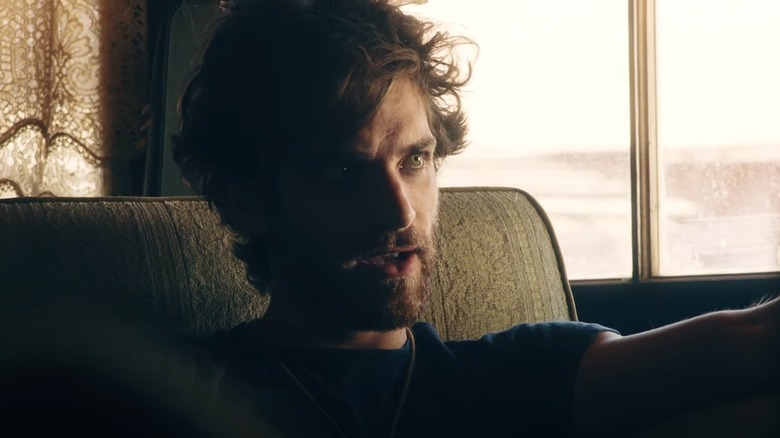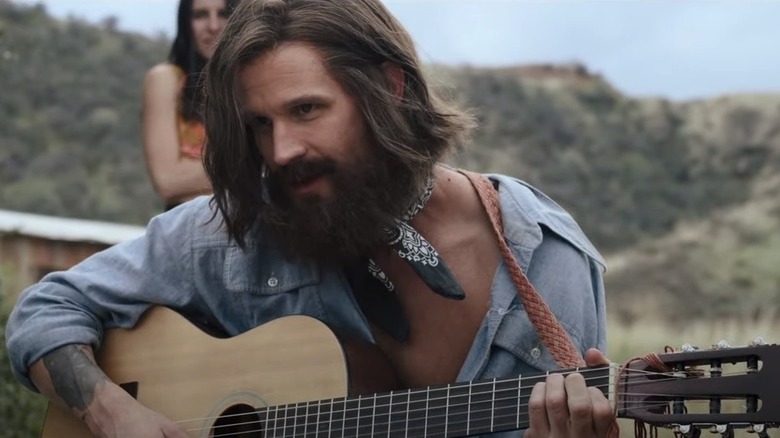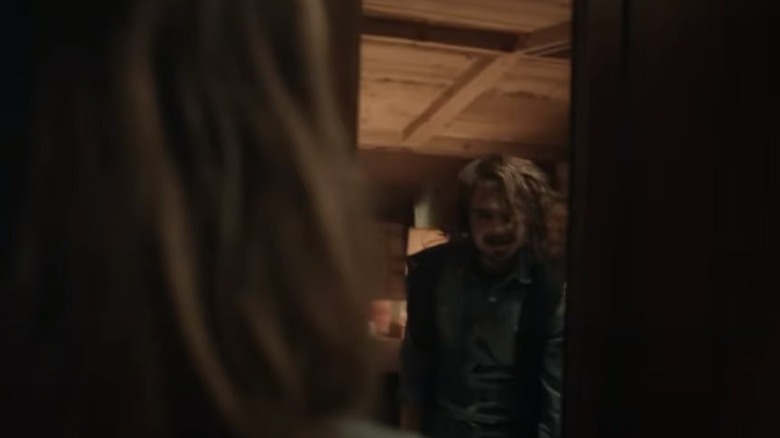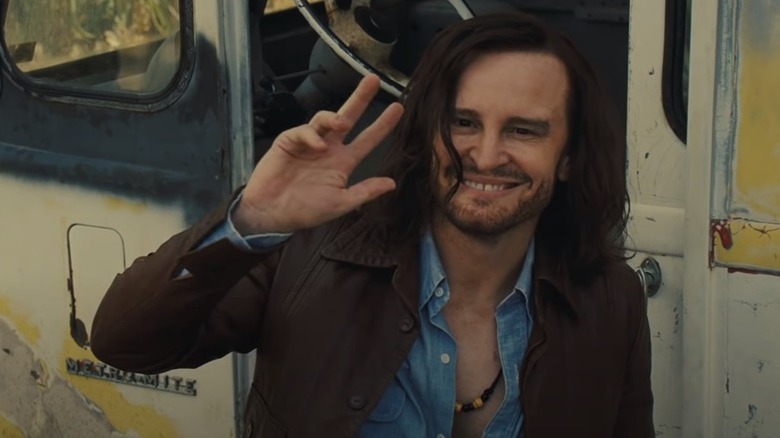Every Actor Who Has Played Charles Manson In A Movie
The Tate-LaBianca murders have all the elements of a horror movie come to life: a beautiful young starlet and her glamorous friends brutally murdered in her Benedict Canyon home; a second night of mayhem that would find an L.A. businessman and his wife slaughtered; and a cult of drug-crazed hippies led by the self-styled messiah behind the killings. Indeed, the madness and terror of those two nights in August 1969 and their aftermath became instant media sensations. In the ensuing decades, the story of cult leader Charles Manson and his so-called "Family" would become a national obsession.
From the scores of books, magazine articles, documentaries, TV exposés, and films based on the infamous murders, true crime enthusiasts still can't get enough of Charles Manson. And the popular media has been more than obliged to meet their demands in ways both thoughtfully informative and exploitatively sleazy. Consequently, a select few actors have had, if not the honor, the dubious distinction of stepping into Manson's creepy-crawling moccasins. In this list, you'll find every actor (to date) who has portrayed Charles Manson in films ranging from quickie, grindhouse shockers to big-budget blockbusters like "Once Upon a Time in Hollywood."
John David, The Other Side of Madness (1971)
"The Other Side of Madness" was produced by film collector, distributor, and exhibitor Wade Williams III, best known for acquiring the rights for Ed Wood's notorious turkey "Plan 9 From Outer Space" in the 1980s. It was directed by Frank Howard and was the first movie to deal with the Tate-LaBianca murders. Per AFI Catalog, the film was shot in 1970 while the trials of Charles Manson and his followers were still underway.
Part documentary, part low-budget experimental film, "The Other Side of Madness" is based on court transcripts and contemporaneous news reports and structured around a series of flashbacks culminating with the Family approaching the LaBianca home. As detailed by PopMatters, Williams, fearing legal action from the involved parties, opted to leave the characters unnamed and credited them simply as "killers," "victims," "witnesses," and "defendants." Elsewhere, Debbie Duff, the actress portraying Sharon Tate, is credited only as "The Starlet," while Manson, played by John David, is referred to only as "Charlie" (via IMDb).
John David, who never appeared in another film, limits his performance largely to wearing a beard and staring ominously. Manson's true presence in the film comes from repeated and uncharacteristically stentorian off-camera voiceovers pronouncing such Charlie-isms as "I am Jesus!" and "Helter Skelter is coming down!" However, Manson's real voice can be heard on the soundtrack, which includes the cult leader's song "Mechanical Man." Sharp-eyed viewers will also spot real-life Manson Family locations such as Waverly Drive, the street where the LaBiancas' house was located, and Spahn Ranch — the Family's hideout in the film.
Steve Railsback, Helter Skelter (1976)
"Helter Skelter" is based on Charles Manson prosecutor and former Los Angeles District Attorney Vincent Bugliosi's definitive account of the investigation and trial of the Tate-LaBianca murders of the same name. Airing on CBS over two nights in April of 1976, the film is one of the most-watched made-for-TV movies of all time and set the standard for cinematic recreations of the infamous crimes, per "The Complete Directory to Prime Time Network and Cable TV Shows 1946–Present."
One of the keys to "Helter Skelter's" success was 21-year-old actor Steve Railsback's compelling portrayal of Manson, which remains a benchmark performance. As detailed in a 2021 interview with TV Store Online, Railsback took a method actor's approach to portraying the notorious cult leader. "I read the 'Helter Skelter' book. I studied his speech. I watched him speak," Railsback said. "Manson had been in several institutions for well over half of his life ... I was thinking about how Manson would be put into solitary and have only himself. So I would get into a dark closet for about forty-five minutes and just sit in there and talk to myself. I wanted to see what that feeling of solitary confinement could feel like."
Despite the success of the TV film, Railsback faced typecasting that nearly ended his career. "I was offered every killer in theatrical or television," the actor told Rolling Stone. "I didn't work for a year."
Michael Reid MacKay, Summer Dreams: The Story of the Beach Boys (1990)
As detailed in rock journalist Steven S. Gaines' "Heroes and Villains: The True Story of the Beach Boys" Dennis Wilson of the musical group the Beach Boys returned to his newly rented home at 14400 Sunset Boulevard in the spring of 1968 to find the house overrun with Manson's women and the cult leader himself. A month earlier, Wilson picked up Family members Patricia Krenwinkel and Ella Jo Bailey while they were hitchhiking. The pair went with Wilson to his home where the three engaged in a sexual tryst. On their second return, Krenwinkel and Bailey returned with Manson — the godlike guru they'd told the musician about — and a dozen or so of their friends. When Wilson encountered the wild-eyed Manson, he asked, "Are you going to hurt me?" to which Manson replied, "Do I look like I'm going to hurt you, brother?"
This bizarre moment is briefly recreated in the 1990 ABC TV movie "Summer Dreams: The Story of the Beach Boys." In the film, Charles Manson is portrayed by veteran character actor Michael Reid MacKay. MacKay, best known for his role as the Mummy in the 1987 cult favorite "The Monster Squad," strikes an odd but uncharismatic note as Manson. Sadly, any merit his short performance may have had is overshadowed by an atrocious wig and fake beard.
Erik Passoja, The Beach Boys: An American Family (2000)
Beach Boy Dennis Wilson's odd friendship with Charles Manson and his followers is explored more fully in the 2000 two-part television movie "The Beach Boys: An American Family," per The Paley Center for Media. Actor, comedian, and voice artist Erik Passoja appears as Charles Manson in part two of the telefilm. The meeting between Wilson — played by soap opera mainstay Nick Stabile — and Passoja's Manson adheres more closely to the facts as related in the book "Heroes and Villains" than the previously mentioned ABC television movie. Notably, it includes such details as the cult leader reverently bowing to kiss the musician's feet.
The film also documents Wilson's ill-fated attempt to jumpstart Manson's music career with a scene featuring a chaotic recording session during which Manson's followers ransack the Beach Boys drummer's house. Where "Summer Dreams" barely touches on the influence Manson and his followers had on Wilson, "The Beach Boys: An American Family" offers a more in-depth exploration of their relationship and how the musician nearly fell under the hippy svengali's spell. Per IMDb, the part of Manson was Passoja's first major role, and he continues to work regularly in TV and as a video game voice artist.
Marcelo Games, The Manson Family (2003)
Ohio-born cult filmmaker Jim Van Bebber, best known for the ultraviolent, low-budget action film "Deadbeat at Dawn," began production on "The Manson Family" in 1988. Working in fits and starts due to budgetary limitations (via Birth.Movies.Death), it would take nearly ten years for Van Bebber to compose a rough cut of the film for the festival circuit, per "Xerox Ferox." Finally completed and released in 2003, "The Manson Family" has received a mix of acclaim and derision for its hallucinatory and graphic depiction of the Tate-LaBianca murders. In an interview with DVD Talk, Van Bebber defended his shocking visuals stating, "Look, if you're going to tell this story, why shortcut the truth? This story is NC-17. Life is not all R-rated. Life is not a PG-13. And certainly, if you're going to discuss these guys and tell the truth, it's obviously going to be NC-17."
In a three-star review of the film, critic Roger Ebert called the film "disgusting yet undeniably powerful," adding that the film's Manson, played by Marcelo Games, "has the charisma of a wino after a night in a dumpster." Nevertheless, Games, who had previously appeared in Van Bebber's "Deadbeat at Dawn," seems to have left acting behind following his role in "The Manson Family," per IMDb.
Jeremy Davies, Helter Skelter (2004)
Actor Jeremy Davies, best known for his role as the cowardly Corporal Upham in Steven Spielberg's World War II epic "Saving Private Ryan," turns in a performance as Charles Manson in CBS' 2004 remake of "Helter Skelter" that Variety called "dazzling." Focusing more on the human story than on the details of the investigation, the 2004 "Helter Skelter" sheds the crime procedural tone of the original for character dynamics and drama. Notably, the film shines a spotlight on Family-member-turned-witness Linda Kasabian.
Davies was originally cast in another Manson project that never materialized. While preparing for that role, the actor made a 20-minute videotape of himself as the notorious cult leader. The tape eventually landed on the desk of producer Mark Wolper, who cast Davies in 2004's "Helter Skelter." In preparation for the role, Davies took a linguistic approach to capturing Manson's speech patterns by transcribing interviews with the killer and breaking them down into vocabulary lessons. "My goal was to find [Manson's] arsenal of language and study his actual interaction with all the interviewers," he told Sioux City Journal.
Ryan Robbins, Manson, My Name is Evil (2009)
Initially released as "Leslie, My Name is Evil," this 2009 Canadian satire came under fire from the press when distributor Lionsgate retitled the film "Manson, My Name is Evil” and attempted to pass it off as a Manson-centered horror film, per Screen Anarchy. Charles Manson, as portrayed by "Riverdale's" Ryan Robbins, is only peripheral to this highly fictionalized account of the trial of Manson disciple Leslie Van Houten. In the film, Gregory Smith plays Perry, a straight-laced young man whose world collides with the madness of the Family when he is picked as juror for the Manson women's trial. As reported by The Globe and Mail, he subsequently develops an infatuation with Van Houten that upends his life.
Combining elements of black comedy, camp, and music, "Leslie, My Name is Evil" largely divided critics and audiences. However, some — including reviewer Shelagh Rowan-Legg of the entertainment website That Shelf — found Robbins' performance a highlight of the film. "Ryan Robbins is particularly striking as Charlie," Rowan-Legg writes. "He conveys his strange and powerful seduction through wild and disarming eyes."
Deron Miller, Dahmer vs. Gacy (2010)
Director Ford Austin pushed the limits of bad taste beyond the breaking point with his gruesome 2010 horror-comedy "Dahmer vs. Gacy." The film's outlandish premise centers on a government laboratory's attempt to create the ultimate soldier by splicing the DNA of the world's most dangerous serial killers. When clones of Jeffrey Dahmer and John Wayne Gacy escape, the two reborn sociopaths go on a competitive cross-country murder spree.
Austin somehow managed to lure comedian Harland Williams, original "Wizard of Oz Munchkin" performer Jerry Maren, and former Guns N' Roses drummer Steven Adler into the gory low-budget, lowbrow hijinks. In the film's final moments, none other than Charles Manson as played by Deron Miller of the band CKY makes a brief and bloody appearance.
After Austin's unabashed and admittedly tasteless treatment of history's most reviled murderers, a run-in with a collector of serial killer memorabilia caused him to slightly reevaluate the film. "I went to a convention and I had a guy come up to me who was collecting serial killer business cards and art ... And he was all over [the movie]," Austin said in a 2020 interview, available on YouTube. "When I had this guy collecting real serial killer merchandise ... I wasn't really proud of it at that moment."
Ryan Kiser, House of Manson (2014)
"House of Manson" was written and directed by filmmaker Brandon Slagle and chronicles Charles Manson's life — from his troubled childhood to the Tate-LaBianca murders and his subsequent trial and sentencing. The first true Charles Manson biopic to date, "House of Manson" was praised by Matt Boiselle of horror entertainment website Dread Central for "taking on a subject that's been beaten to death and giving it a totally new perspective."
Actor Ryan Kiser, with his straight, shoulder-length brown hair and scraggly goatee, lends a Christlike air to his portrayal of Manson. His resemblance to traditional artistic interpretations of Christ was not lost on Lady Gaga, who cast the actor as Jesus in her music video "G.U.Y."
Kiser — along with "Once Upon a Time... in Hollywood's" Damon Herriman — has played the infamous cult leader twice. He first portrayed Manson in Vaughn Juares' 2009 short "Lie," which dramatizes the madness behind Manson's brief association with Dennis Wilson of the Beach Boys and the ill-fated 1968 recording session that was meant to be the cult leader's professional music debut. The short film also depicts Manson's meeting with record producer Terry Melcher, which would indirectly lead to the murders of Sharon Tate and her friends at her rented Cielo Drive home the following year, as explained in "Helter Skelter."
Stephen Cardwell, Haunting Charles Manson (2014)
"Haunting Charles Manson" is a 2014 independent short film from writer-director Mick Davis that was originally titled "Charlie is my Darlin'." As Davis explains on the film's official website, the project's premise is built on the conceit of filmmaker Roman Polanski — the husband of slain starlet Sharon Tate — exacting an artistically inspired revenge. This retribution comes in the form of an apparent series of paranormal encounters targeted at Manson to get the cult leader to admit his guilt. Davis writes, "I wanted to do something that was a social statement about people we know. Roman Polanski is an academy award-winning director and Charles Manson is the most famous serial killer in modern American history. These two men are linked for eternity, but they had never met each other until I made this movie."
"Haunting Charles Manson" is notable in that it is the first film to feature an imprisoned Charles Manson in his later years. The late Stephen Cardwell, a veteran of many short films, stars as an oddly avuncular Manson.
Jeff Ward, Manson's Lost Girls (2016)
"Manson's Lost Girls" is a 2016 Lifetime movie that depicts a rather sanitized and glossy portrait of the Manson Family. Focusing primarily on the women who did Manson's bidding, the film stars Mackenzie Mauzy as Linda Kasabian, Eden Brolin as Susan Atkins, Isabel Shill as Patricia Krenwinkel, Greer Grammer as Leslie Van Houten, and Grace Victoria Cox as Lynette "Squeaky" Fromme. And of course, actor Jeff Ward of Netflix's "Brand New Cherry Flavor" co-stars as Charles Manson. Ward, with his conventional good looks and piercing blue eyes, seems an odd choice to play the infamous cult leader. Besides not having even a passing resemblance to Manson, Ward also doesn't attempt to mimic Manson's trademark mannerisms or patterns of speech, as evidenced in this Lifetime clip.
In order to prepare for the role, Ward took a crash course in Charles Manson's mad world. "I learned everything [about Manson] that I possibly could in the timeframe that I had — I had about two weeks which was not a lot of time," Ward told Popcorn Talk. "I read and watched and listened to everything I could possibly find. So that was a really big part of it — understanding who he was as a person, where he came from."
Matt Smith, Charlie Says (2018)
According to Cinapse, "American Psycho" director Mary Harron's 2018 film "Charlie Says" is based in part on author Karlene Faith's 2001 book, "The Long Prison Journey of Leslie Van Houten." The movie focuses largely on accused killer Leslie Van Houten's story and Manson's hypnotic hold on his female followers. Overshadowed by the release of Quentin Tarantino's "Once Upon a Time... in Hollywood," ”Charlie Says" unfortunately became known as 2019's "other Charles Manson movie," per The New York Times. Nevertheless, the film has the backing of an acclaimed director and cast and received some positive critical reception.
"Charlie Says" features the highest-profile actor to portray Manson to date in English actor Matt Smith. Smith is beloved by millions of sci-fi fans for his role as the 13th incarnation of the time-traveling alien known as the Doctor on the long-running BBC series "Doctor Who." And he does a respectable job channeling Manson's voice and movements. After the film wrapped, Smith still found Manson an unsolvable enigma. "I still have absolutely no idea who he is, and there's something about that that is fascinating," he told Entertainment Weekly. "I don't know where the true Charlie and the false Charlie ends," he said elsewhere in the interview.
Ben Mellish, The Haunting of Sharon Tate (2019)
British actor Ben Mellish is a barely-there Charles Manson in the 2019 horror film "The Haunting of Sharon Tate." Mellish's Manson is little more than a shadowy jump scare, which is a fortunate turn for the actor considering the well-deserved drubbing "The Haunting of Sharon Tate" received.
The movie's shaky premise is built on an interview with Tate published in Fate Magazine the year after the actress' murder in which she claimed to have a premonition of her violent death, per Marie Claire. The film, which stars Hillary Duff as Tate, is a fictionalized account of the slain starlet's final days at 10050 Cielo Drive. Tate's sister, Debra, who debunked the premonition tale in a 2018 People interview, slammed the picture. "It doesn't matter who it is acting in it — it's just tasteless," she said. "It's classless how everyone is rushing to release something for the 50th anniversary of this horrific event."
Damon Herriman, Once Upon a Time... in Hollywood (2019)
Like "House of Manson's" Ryan Kiser, Australian actor Damon Herriman has portrayed Charles Manson on screen twice — once in the hit Netflix crime show "Mindhunter," and another time in Quentin Tarantino's 2019 fairy tale of 1969 Los Angeles, "Once Upon a Time... in Hollywood." Manson, however, is only peripheral to the events of Tarantino's film, and Herriman's role as the cult leader takes up only a few minutes of the picture's nearly three-hour running time.
Just prior to being cast in "Once Upon a Time... in Hollywood," Herriman learned he had also been cast as an older, 1980s era Manson in "Mindhunter," in which he has considerably more screen time. As detailed in an interview with People, Herriman thought it was a "fruitless exercise" to vie for the role of the notorious cult leader in two major projects. Nevertheless, he "didn't want to not do an audition for Quentin Tarantino."
